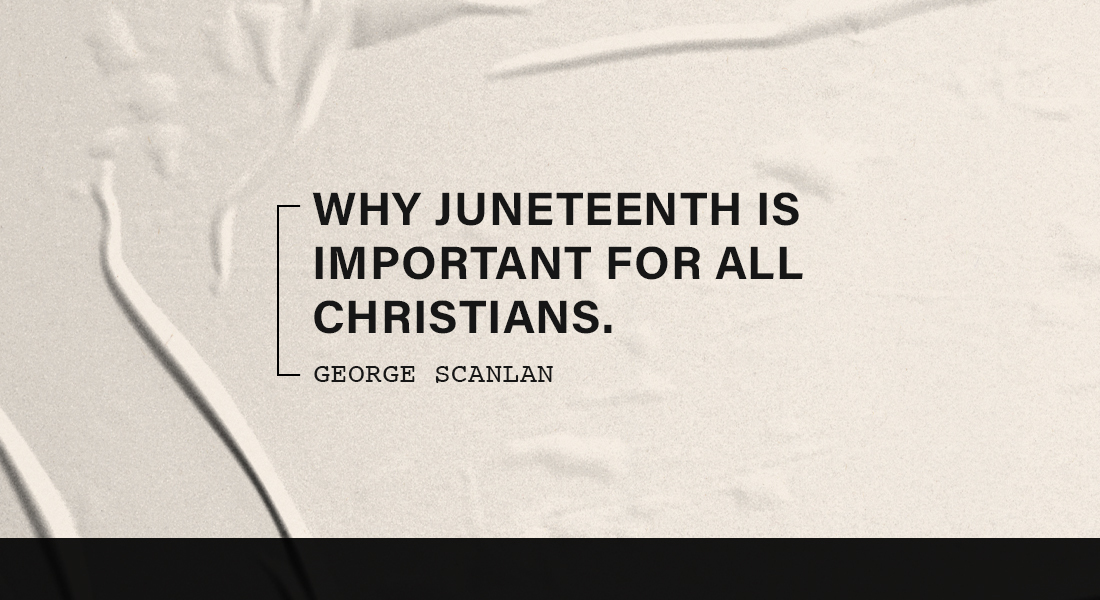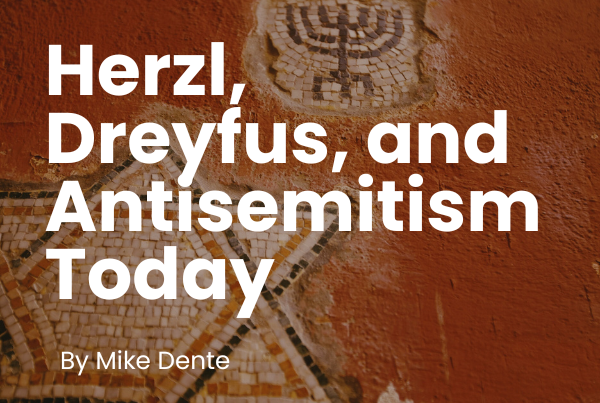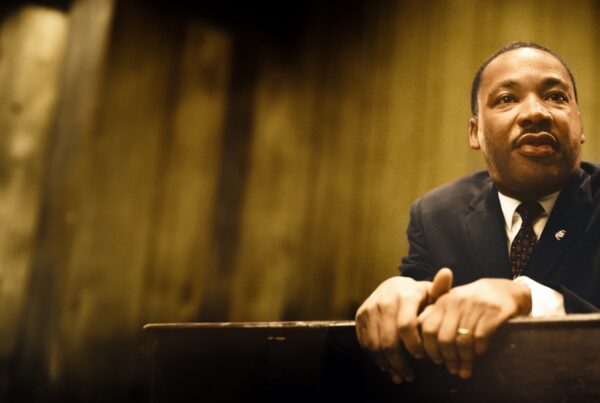
Why should Juneteenth be important for all Christians? Before we consider the answer, a brief history lesson will be helpful.
What is Juneteenth?
Juneteenth (June + nineteenth) celebrates the date in 1865 when the last stronghold of slavery in the Union, Texas, received a formal decree to liberate all slaves. Though the Emancipation Proclamation had been in effect for nearly two and a half years, many thousands of black slaves remained in bondage. While word indeed traveled slower in those days, the information seemed to travel slowest across the many plantations in Texas, where wealthy slave-owning plantation owners and southern gentility had fled after the Confederate Army’s surrender. From the onset of the Civil War, new mansions and plantations sprung up in Texas as the wealthy migrated to the westernmost southern state. Though most of the South had acquiesced to the demands of the Emancipation Proclamation, southern life in Texas had continued uninterrupted with all antebellum convention. So much so that when Union General Gordon Granger arrived in Texas to issue “General Order Number Three,” some 250,000 black men and women were still toiling beneath the whips of their owners, none the wiser of the news of liberty issued by the Federal Government.
General Order Number Three
Now, two and a half years after the Emancipation Proclamation had taken effect, and at the head of 2,000 Union troops, General Granger had come to enforce the liberation of slaves. On June 19, 1865, General Granger made the following announcement:
“The people of Texas are informed that, in accordance with a proclamation from the Executive of the United States, all slaves are free. This involves an absolute equality of personal rights and rights of property, between former masters and slaves and the connection heretofore existing between them, becomes that between employer and hired labor. The Freedmen are advised to remain at their present homes and work for wages. They are informed that they will not be allowed to collect at military posts; and they will not be supported in idleness either there or elsewhere.”
In short, the mass release of slaves was to happen forthwith. However, the transition that ensued was far from simple. Many slave owners kept their slaves in the dark until after the next harvest season, while others attempted to keep the news of their ordered release hidden altogether. Notwithstanding, when June 19 came the following year, the last vestiges of slave ownership had passed away, and the historic date became known as “Black Independence Day,” “Emancipation Day,” or “Juneteenth.” Ex-slaves gathered in their communities, celebrating their freedom with expressions of the unique culture they developed during centuries of bondage. These expressions included prayer gatherings, music, singing of spirituals, parades, historical readings, and the sharing of food. In the years following, the celebrations also included training sessions on citizenship, including learning how to vote. Presently, 46 of 50 states commemorate Juneteenth, Texas being the first to recognize it as a state holiday in 1980.
Why Would White Americans Celebrate Juneteenth?
Far beyond whiteness, how do any non-black Christians who are not descendants of slaves identify with Juneteenth? Even in the most perfunctory sense, all Christians could join Juneteenth celebrations in light of the Biblical encouragement to share in the joys of others (Romans 12:15). Though such a limited reason might be a step in the right direction, it would entirely and tragically miss the most profound and resonant Biblical connections to slavery to which the white American Church is beneficiary.
The Bible Is A Book for the Oppressed
The Bible is a book written by the oppressed for the oppressed. An exile wrote the Pentateuch to a nation of ex-slaves. The Prophets were written for the most part by societal rejects and cast-offs who experienced imprisonment, torture, and execution, and whose intended audience was a people headed towards, in the middle of, or headed back from exile. The Gospels were written by and delivered to a people oppressed by a foreign dictatorship. The Epistles were written by the persecuted for a persecuted and oppressed Church. The apostle John’s contributions to the Bible place a heavy emphasis on the Church being those who “overcome” (Revelation uses the phrase “to him who overcomes,” referencing the individual believers that make up the Church, nine times). In addition to societal oppression experienced by the Bible authors and audience, the entire message of the Bible points to the need for liberation from the ubiquitous bondage of sin. The announcement of the formal end of the oppression and enslavement of black people in America should resonate with all who understand their own need for spiritual liberation. Moreover, it should resonate with anyone who claims to worship Jesus, who identifies Himself as the one anointed “to proclaim liberty to the captives and recovery of sight to the blind, to set at liberty those who are oppressed” (Luke 4:18).
Liberation is One of the Greatest Themes in the Bible
Beginning in Genesis 3, the protoevangelium brought hope to the first man and woman, who found themselves in thralldom to sin, death, and a world ruled by the serpent and his worshipers. Later, when Abraham, Isaac, and Jacob’s descendants found themselves enslaved to the serpent-worshiping nation of Egypt and their proud god-king, the Lord God heard their cries. Seeing their mistreatment, He came to deliver His covenant people by His “strong hand,” crushing the gods of Egypt. After centuries of crying out to Him, and as generations lived in slavery beneath the taskmaster’s whip, He delivered the Children of Israel. Fast-forward to the final death-blow to the serpent himself. The greatest triumph over oppression came through the lashings and crucifixion of Jesus on Calvary. Our hope, the greatest hope for all believers, is the deliverance from death, from the effects of sin, and one day, from the very presence of sin. To see the end of the oppression of any people group should resonate with all who understand their own deliverance by Jesus from the serpent, sin, and death.
Juneteenth is About Equality and Unity
The issue of slavery was a major contributing factor in the Southern State’s decision to secede from the Union, ushering in the Civil War. And the case of Dred Scott was a significant contributing factor in the mass, anti-slavery sentiment in the Northern States.
On March 6, 1857, in what would become a watershed moment, the Supreme Court ruled against Dred Scott, a slave suing the Federal Government for freedom. While the case was complicated, then Chief Justice Roger Taney reduced the issue to this question:
“Can a negro whose ancestors were imported into this country, and sold as slaves, become a member of the political community formed and brought into existence by the Constitution of the United States, and as such become entitled to all the rights and privileges and immunities guaranteed to the citizen?”
His response to his question, and the sentiment of his assenting fellows, are summarized in his following statement:
“We think they are not, and that [black people] are not included, and were not intended to be included, under the word “citizens” in the Constitution, and can therefore claim none of the rights and privileges which that instrument provides for and secures to citizens of the United States. On the contrary, they were at that time considered as a subordinate and inferior class of beings, who had been subjugated by the dominant race, and, whether emancipated 18 or not, yet remained subject to their authority, and had no rights or privileges but such as those who held the power and the government might choose to grant them.”
He also said that “a perpetual and impassable barrier was intended [by the nation’s founders] to be erected between the white race and the one which they had reduced to slavery, and governed as subjects with absolute and despotic power, and which they then looked upon as so far below them in the scale of created beings, that intermarriages between white persons and negroes or mulattoes were regarded as unnatural and immoral, and punished as crimes, not only in the parties, but in the person who joined them in marriage. And no distinction in this respect was made between the free negro or mulatto and the slave, but this stigma, of the deepest degradation, was fixed upon the whole race.”
Though intended to end any future discussion of emancipation, the verdict had the opposite effect. The pronouncement proved incendiary, igniting an incredible backlash against the reprehensible decision (and forever tarnishing the involved justices’ reputations). The pro-abolition populous of the Northern States sought to elect a champion who could bring reform to such sinfully racist courts, finding one in the young representative from Illinois, Abraham Lincoln. His inauguration was the final blow that pushed the Southern Confederacy to secede from the Union, igniting a civil war.
Contrasting the repugnant decision in the Dred Scott Case, however, was the announcement read by General Granger eight years later in Galveston, which included crucial corrective verbiage. He proclaimed that the freeing of slaves “involves an absolute equality of personal rights and rights of property, between former masters and slaves…” Finally, as General Granger read aloud “General Order Number Three,” the last outpost of slavery within the United States was confronted with the biblical truth of the Imago Dei: all people are equally created in God’s image, and deserving of dignity. While racism didn’t end that day in Texas, the date of June nineteenth commemorates the end of legal ownership of slaves in America. The announcement made that day meant that all people, including former masters and slaves, had equal value. This idea of the raising of black slaves to the position of equality with all other peoples as divine image-bearers should fill our hearts with poignant joy every time we sing the Christmas song, “Oh Holy Night:”
Truly He taught us to love one another;
His law is love, and His gospel is peace.
Chains shall He break for the slave is our brother;
And in His name, all oppression shall cease.
Juneteenth Celebrates the End of a National Sin
Slavery in America, and the slave trade itself, has been wrong from the beginning. The practice of stealing and selling people was a typical, wicked practice among the nations that surrounded Israel. However, God explicitly outlawed such evil, declaring it to be punishable by death (Exodus 21:16). Even still, the buying, selling, and owning of slaves became prevalently common in Europe and America. Sadly, this practice was not limited to the secular population; many self-identifying Christians owned slaves. Among such are many names revered in America, including founding fathers and ministers of the Gospel. However, no matter their background or justification, the ownership of slaves is and has always been wrong.
Though the institution’s sinfulness was less evident to many domestically, for many Christians outside of America, its stain was obvious. After experiencing a radical conversion to Christianity and having sought the counsel of John Newton about whether to remain in public office, a young William Wilberforce resolved to “commit his life and work to service of God” and to remain in politics with “increased diligence and conscientiousness.” His later meeting with Rev. James Ramsay would prove momentously significant, as he heard firsthand of the horrifying conditions and treatment of slaves on British sugar plantations and transport ships. With a strong desire to put his Christian principles into action and serve God with his public life, Wilberforce soon began a quest that would outlive him, but would eventually result in the abolition of slavery in most of the British Empire.
Charles Spurgeon also championed an anti-slavery, abolitionist message from his pulpit and published works. He made his position on the equality of slaves plain by regularly receiving ex-slaves into his Pastor’s College and his pulpit. He articulated well his feeling toward slave owners when he wrote: “I do from my inmost soul detest slavery . . . and although I commune at the Lord’s table with men of all creeds, yet with a slave-holder I have no fellowship of any sort or kind. Whenever one has called upon me, I have considered it my duty to express my detestation of his wickedness, and I would as soon think of receiving a murderer into my church… as a man stealer.”
Spurgeon’s sermons became so unpopular in the Southern states of America that published comments from many states included insults and attacks on his character and a call to host public burnings of his printed sermons.
As grateful as we can be to such men for their legacy of Christian love and commitment to Gospel-centric equality, many of their contemporaries viewed such stances with apathy or opposition. However, Juneteenth marks the final victory for the many voices that stood against the abhorrent institution of slavery. Our country is still beleaguered with abominable national sins, but Juneteenth marks the day when a world-sized, centuries-spanning sin was finally conquered.
A Lesson for Modern Americans
The historical slave trade in America is gone. As with any national-level sin, however, there remains deep social wounding and scarring that will take generations to address truly. If a nation genuinely desires to see restoration from a national sin, there must come a time when, like in the book of Nehemiah, the nation owns up to them. To magnify James 5:16 beyond interpersonal relationships and to project it over an entire country, we must see that healing comes through the ownership and transparency of our sins, and through prayer. Juneteenth symbolizes the day an unrighteous institution was broken, and when God Almighty delivered America’s domestic slave population. But it can also signify a day when non-black Christians rejoice WITH our black brothers and sisters who were physically set free. We can celebrate the many Christians who rose beyond apathy and fought and spoke out against the great injustice of slavery. We can listen and talk about the Savior who came to release the captives and free the oppressed, and by whose grace we all stand on equal footing before the Cross. Perhaps through the commemoration of this monumental day, we can begin the much needed, Christ-honoring, and neighbor loving healing that Jesus died to make possible.
Why should Juneteenth be important for all Christians? Because after generations of calling on the Lord for deliverance, our black brothers and sisters were set free. And setting captives free is exactly what Jesus came to do.
. . .
Postscript
As I worked through various articles and writings on the subject of Juneteenth, one piece of information in particular stood out to me; a song called, “Lift Every Voice and Sing,” by James Weldon Johnson. The song was originally written as a poem but was later put to music by his brother. It was first publicly sung by 500 schoolchildren in celebration of Abraham Lincoln’s birthday on February 12, 1900, in Jacksonville, Florida. It has become a popular song to sing on Juneteenth, and also became a cherished song during the African American Civil Rights movement. It’s both a beautiful and haunting song, and the final verse presented here resonates with similar gratitude to God that Israel expressed in song in Exodus 15:
God of our weary years,
God of our silent tears,
Thou who has brought us thus far on the way;
Thou who has by Thy might Led us into the light,
Keep us forever in the path, we pray.
Lest our feet stray from the places, our God, where we met Thee,
Lest, our hearts drunk with the wine of the world, we forget Thee;
Shadowed beneath Thy hand,
May we forever stand.
True to our God,
True to our native land.
. . .
Notes
Congressional Research Service – Juneteenth
Library of Congress – Dred Scott Case Decision
Texas State Historical Association – Juneteenth
“Wilberforce, William (1759–1833)”, Oxford Dictionary of National Biography, Oxford University Press
https://www.spurgeon.org – The Reason Why America Burned Spurgeon’s Sermons and Sought to Kill Him






